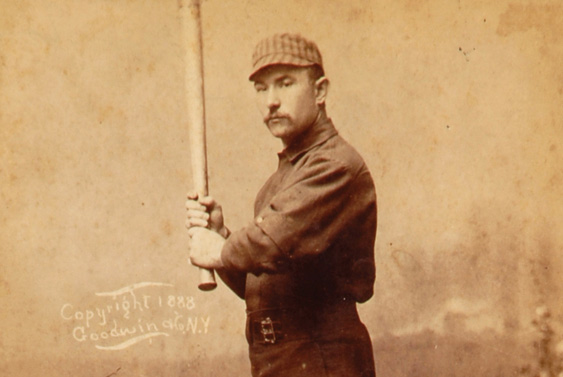Historical Hitter September 1 1890: Tom Oyster Burns

 On this day one of baseball’s most unusual event occurred: a triple header. In the three games for the price of one the Brooklyn Bridegrooms’s swept it from the hapless and mismatched Pittsburgh Alleganys. It was in 1890 and during the height of the Players League attempt, which weakened both leagues. Also good news for Pittsburgh; their team would be renamed the Pirates the following season. The games started at 10:30 AM. The first game took 91 minutes, the second game 92 minutes, and the third they were worn out and spent 105 minutes. Combined it was 4 hours and 47 minutes and 27 innings of baseball delight for Brooklyn. Actually not much longer than a Red Sox Yankees game.
On this day one of baseball’s most unusual event occurred: a triple header. In the three games for the price of one the Brooklyn Bridegrooms’s swept it from the hapless and mismatched Pittsburgh Alleganys. It was in 1890 and during the height of the Players League attempt, which weakened both leagues. Also good news for Pittsburgh; their team would be renamed the Pirates the following season. The games started at 10:30 AM. The first game took 91 minutes, the second game 92 minutes, and the third they were worn out and spent 105 minutes. Combined it was 4 hours and 47 minutes and 27 innings of baseball delight for Brooklyn. Actually not much longer than a Red Sox Yankees game.
The hitting hero was Oyster Burns who played Right field that day. He was 3 for 9 with a single (game one), triple (game two), and home run (game three). He was just a double short of a one day cycle.
1890 was a career year for Oyster, he led the league in Home Runs with 13 and RBI with 128, but he hit below his lifetime .300 average with a .284 in 1890. According to tradition, he received his nickname oyster by selling them in the offseason.
Oyster played 11 years in the majors from 1884 to 1895, and saw the mound move back to its current position and pitcher go from underhand to overhand pitching. He played in 1188 games and belted out 1392 hits and ended up with a career OPS+ of 135, the same OPS as George Brett and ahead of Al Kaline and Al Simmons. He was noted for playing every position but catcher and was a league leader in Games Saved as a pitcher, and led the league one time in triples, home runs and RBI.
Sweeping this triple-header was icing on the wedding cake for these Bridegrooms, as they won their first National League Pennant by 6.5 games over the Cubs. For the record 1890 was a horrible year for the Pittsburgh Nationals who finished some 66.5 GB and touted a .169 winning percentage.
1890 was a watershed year for Brooklyn as it was their first year in the National League having jumped from the old American Association in 1889. It was also the time of the exhibition World Series between the American Association and National League, and for Brooklyn it ended with a dud, they tied the Louisville Colonels 3-3-1.
Oyster made the pages of Sporting Life Magazine in a game in Cincinnati early in the 1890 season. The Bridegrooms had just scored six runs in the top of the seventh to get within one run, 11-12. But in the next half inning the Reds scored 8 to put the game out of reach.
T. Oyster Burns let out a war-whoop after “the scoring of the six” that started the rivets in the opera chairs. “Oh. no, we never could play ball in this town!” he yelled. But the whoop died into a groan after the slaughter of Lovett.
He spoke too soon and too loud. His voice was once described as a buzz-saw, no doubt his yell ignited the home town Reds. Contemporary players of Oyster Burns noted that he was the possessor of an irritating voice and grating clubhouse personality. A former teammate from his Baltimore Orioles days called him a disturber with a very bad disposition and made life unpleasant for those who “crested” him. He came up as a In the July 19, 1890 edition of Sporting Life, had the following commentary:
TOM BURNS, of Brooklyn, isn’t the best captain in the world, but he works hard for his club’s success.

Part of his hard work as team Captain in the roaring 90’s Burns was fined by Umpire $25 for an outburst, but after the game the fine was remitted.
All in all, Tom Oyster Burns was selected as a participant for a west coast barnstorming trip to San Francisco and Denver. And then in late December he was selected to participate in an “indoor” baseball game that would be played in the old Madison Square Garden.
T. Oyster Burns, team captain, home run leader, RBI producer but known as an irritating person, led Brooklyn’s Bridegrooms to a National League Pennant in their first year in the League is yesterday’s historical batter of the day. While an excessively bothersome person in the clubhouse his batting prowess, baseball athleticism, and fine fielding kept him in the league. Somehow and despite his buzz-saw voice and annoying personality he was selected player-coach and later manager of a few minor league teams.
Sources:
Sporting Life Magazine:
- Volume 15, Number 16, July 19, 1890
- Volume 15 Number 19 August 9, 1890
- Volume 15, Number 21, August 23, 1890
- Volume 15, Number 23 September 6, 1890
- Volume 16 Number 1, October 4, 1890
- Volume 16 Number 5, November 1890
- Volume 16 Number 12, December 20, 1890
Wikipedia cites Shafer, Ronald G (2011) When the Dodgers were Bridegrooms: Gunner McGunnigle and Brooklyn’s Back-to-Back Pennants of 1889 and 1890. McFarland Books, p 84.
Baseball-reference.com
Baseball-almanac.com
